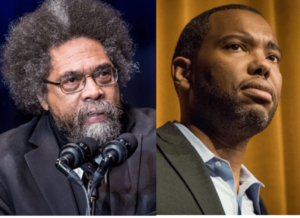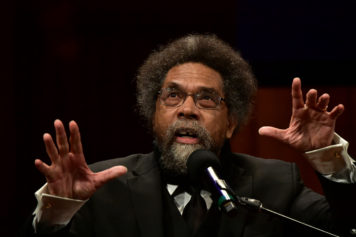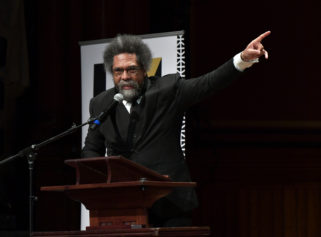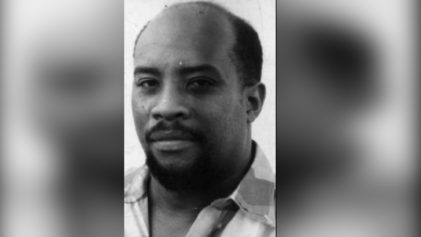
Cornel West (left) has been deeply critical of Ta-Nehisi Coates (right) recently, reflecting a longstanding history of Black intellectuals airing their differences in public. (Photos: Wikimedia Commons)
Cornel West’s sharp critique of Ta-Nehisi Coates in The Guardian — in which the Harvard professor called the younger author and correspondent for The Atlantic “the neoliberal face of the black freedom struggle” — has elicited reactions across the Black intellectual community. This public airing of differences, which is nothing new among Black thinkers, raises the question as to whether there is room to hold such debates today, in the open, and whether Black intellectuals are off limits and above reproach.
In his commentary, Dr. West takes Coates to task for focusing on white supremacy in his worldview, to the exclusion of the role of Wall Street, U.S. military power, and issues of class, gender and sexuality. Coates, West wrote, comes from the Black freedom struggle, but represents the neoliberal wing that talks about white supremacy in a militant tone, but renders Black resistance invisible. “This wing reaps the benefits of the neoliberal establishment that rewards silences on issues such as Wall Street greed or Israeli occupation of Palestinian lands and people.”
According to West, Coates fetishizes white supremacy, rendering it “almighty, magical and unremovable” while providing no personal commitment to collective action in his writing. The veteran scholar and activist also cited Coates for comparing President Obama — whom West characterizes as the first Black leader of the American empire — to Malcolm X—who was the most prophetic voice against white supremacy.
Among the many Black voices who have weighed in on Cornel West’s critique, writer and Columbia journalism professor Jelani Cobb wrote one of the more noteworthy and detailed responses on Twitter, of which excerpts are included below:
I’ll start by saying I’m not a disinterested party. @tanehisicoates is one of my oldest friends. We go all the way back to the days when we were both aspiring writers at Howard and his pops was a mentor-figure to the young activists and thinkers on campus.
— jelani cobb (@jelani9) December 18, 2017
2. And also, given what I do for a living and the necessity of intellectual engagement I should say up front that no one is above critique. It’s an indispensable part of growth. But I was frankly embarrassed by @CornelWest’s threadbare commentary.
— jelani cobb (@jelani9) December 18, 2017
3. It’s one thing to challenge and interrogate. Quite another to cloak petty rivalry as disinterested analysis. Neoliberal? What part of neoliberalism demands reparations @CornelWest — and places that demand squarely within the history of racist American public policy.
— jelani cobb (@jelani9) December 18, 2017
Cobb told Atlanta Black Star he did not want to comment further on the matter. As a result of the feud with West, Coates deleted his Twitter account.
“I think we live in such a market culture where the first thing that comes to mind is competition and trashing, and the very critique is viewed as a takedown and reduced to competition,” West told Atlanta Back Star. “The freedom struggle is not a commercial. Issues are at stake here. It was the [case] since we were brought here on slave ships. What are we going to do while we were here?”
Responding to the reactions to his most recent commentary, West referred to debates on Twitter as “adolescent dialogue” with “no room for serious conversation. They can only project on me what is coming out of them, concerned about spotlight,” he said of his critics. “They think every move is about spotlight,” West said.
“I think it’s very difficult to make people accountable and not trash them,” West said. “In a market culture, everyone is concerned about success. You are supposed to give them a standing ovation. A jazz musician’s never looking for a standing ovation. Coltrane is coming from it out of his soul, he’s not looking for a standing ovation. The highest expression of our genius has been through the music,” he added.
“The problem with these middle-class Negroes is they’re scared of losing their job. They’re scared their image is going to be besmirched. There is a fear-driven Black professional class preoccupied with status,” West added. “You’re in the world, not of it. That’s what we love about Malcolm, about Martin, about Fannie Lou Hamer. They weren’t scared.”
This heated public discourse between West and Coates is by no means a new phenomenon, but rather one with a deep-running historical context. Beef goes way back, and African-American thinkers and leaders have voiced their disagreements for years, contributing to a robust exchange of ideas impacting Black people and their future. Never have all Black folks been on the same page and singing from the same hymn book. Often it became personal, and the parties involved did not retreat from their stances. For example, W.E.B. Du Bois and Booker T. Washington both believed in the uplifting of the race but had different approaches to getting there. Du Bois believed in the “Talented Tenth” leading the way for Black people, somewhat of an old-school version of respectability politics, while Washington advocated for Black people becoming economically independent, elevating themselves through education and self-help and accepting segregation and discrimination from white society for the time being. West noted that Du Bois and Ida B. Wells were blacklisted and pushed to the margins for their criticism of the Tuskegee Institute founder.
While Du Bois and Marcus Garvey ultimately embraced Pan-Africanism, they had their differences that spilled into the public realm. Du Bois critiqued Marcus Garvey and his Black Star Line in the NAACP’s Crisis magazine, while Garvey criticized the NAACP and its plethora of white and light-skinned Black people. The two men traded personal insults, with Garvey calling Du Bois “a little Dutch, a little French, a little Negro … a mulatto … a monstrosity,” and Du Bois characterizing Garvey as “a little, fat black man; ugly, but with intelligent eyes and a big head.”
Wets recalled that Malcolm X called Martin Luther King’s March on Washington a picnic, believing the Black leader should not have made that characterization, but not questioning his right to say it. Malcolm X and Bayard Rustin debated in public, sparring over integration vs. separation when Malcolm was in the Nation of Islam.
In recent years, Georgetown professor Michael Eric Dyson wrote a 10,000-word essay in The New Republic highly critical of West. And West, a strong supporter of Obama, later became vocal in his opposition to the policies of the first Black president. “We invested so much in his success. He was brilliant, poised, he had a magnificent family, but when it came to delivering for black people, for poor people, for Palestinians, for working and poor people in Pakistan and Afghanistan, he came short,” West said, also pointing to the drone strikes under Obama and the bailing out of Wall Street. The Obama years were a source of pride for the Black community, but also a time of the largest loss of Black wealth in the nation’s history following the Great Recession, in which banks who engaged in the subprime mortgage fiasco were bailed out, but Black America was not saved economically.
Ultimately, Dr. West believes this airing of superficial differences will be a good thing, and he foresees the need for a public discussion with Coates. “We have to have criticism, and it’s going to be passionate,” he said. “All this suffering generates passion. We’re not here for a tea party.”
“The white power structure is always trying to trot out people that make them feel comfortable,” West argued. “Honest criticism of each other is the only way for us to move forward.”


